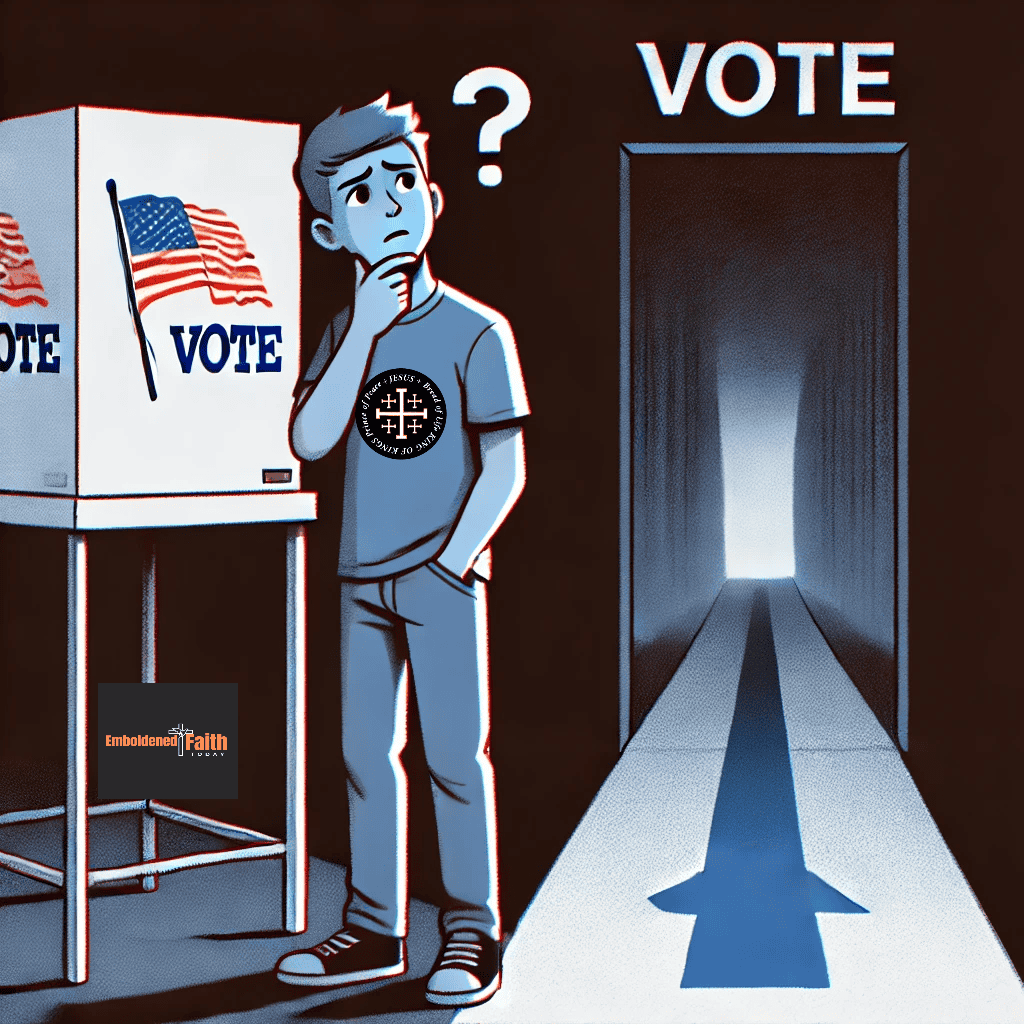There’s talk that millions of church-going Christians are sitting out this 2024 presidential election and not voting, even for local candidates and issues, apparently. I understand their predicament. “Seek first the Kingdom of God” (Matthew 6:33) is a statement of Jesus’ that Christians apply to the whole of their lives, as they should, including the civic life. And their interpretation of that statement can keep Christians away from the polling place, especially when everything political is muddied.
There’s a big turnoff about the way politics is carried out, today – the big money, the big lies, the great polarization over every topic. Not that politics has ever been immune to any of that, it just seems so extreme – and obvious – nowadays.
I am not a “political animal,” and so I grow weary from the whirlwind of political activity all around during these seasons. But that’s the nature of living in a democracy. Moreover, citizens past and present have given of themselves to keep the privilege of self-government alive for me to experience. The least I can do is to take some interest in the issues and candidates and let my two cents worth be heard through the ballot box.
And as I am a Christian, I am convinced there are even more reasons to participate, even if minimally, in my local and national politics. I join with other Christians who understand that while living in a democracy, we have a duty to exercise our right to participate in the electoral process and vote.
Here, briefly, are eight compelling reasons why voting is a Christian duty:
- Stewardship of Influence: The ability to vote is to have a form of influence that we are entrusted with as citizens. The Parable of the Talents (Matthew 25:14-30) teaches us to be good stewards of what we’ve been given. By not voting, we are essentially burying our talent rather than using it to further God’s purposes in our society.
- Compounding Good: Akin to stewardship, just as we are called to compound spiritual blessings, voting allows us to compound the good we can do in society. Each vote has the potential to influence policies that affect millions of lives.
- Loving Our Neighbor: Jesus commands us to love our neighbors as ourselves (Mark 12:31). Voting gives us the opportunity to advocate for policies and leaders that can positively impact our communities. By abstaining from voting, we may be neglecting our duty to seek the welfare of others and potentially allowing harmful policies to go unchallenged.
- Salt and Light: Christians are called to be “salt and light” in the world (Matthew 5:13-16). Voting allows us to exert a positive influence on our society, preserving and promoting values aligned with our faith. Failing to vote could mean ceding ground to ideologies that may be at odds with Christian principles.
- Seeking the Good of the City: The prophet Jeremiah instructed the exiles to “seek the peace and prosperity of the city” where they were living (Jeremiah 29:7). In a democratic society, voting is one of the ways we can actively “seek peace and prosperity” for the betterment of our communities and nation.
- Responsible Citizenship: Romans 13:1-7 teaches us to be subject to governing authorities. In a democracy, this includes participating in the process of selecting those authorities through voting. We determine the authorities and laws by which we will abide only when we vote.
- Mitigating the Suffering of All Our People: By voting for policies and leaders that align with Christian values of compassion and justice, we can potentially mitigate suffering (including quasi-political tyranny) and promote the well-being of those in distress in our society.
- Potential Impact on Evangelism: An anti-Christian leaning government could potentially restrict religious freedoms and hinder evangelistic efforts. By voting for leaders who protect religious liberty, we help maintain an environment conducive to sharing the Gospel.
While “seeking first the kingdom of God” is paramount, this doesn’t negate our earthly responsibilities. Let us not be mistaken about that. Rather, let it inform how we engage with the world, including how we vote. Voting, when approached prayerfully and with discernment, should be understood to be an act of obedience to God and love for our neighbors.
As Christians in a democracy, absolutely, yes, we should vote. We have been entrusted with the responsibility to be engaged citizens. Voting is not just a civic duty, but a way to actually live out our faith and steward the influence God has given us in our society.
Let us not be disheartened. Let us not be disengaged. Let us not be lazy. But, yes, let us get out the Christian vote.

